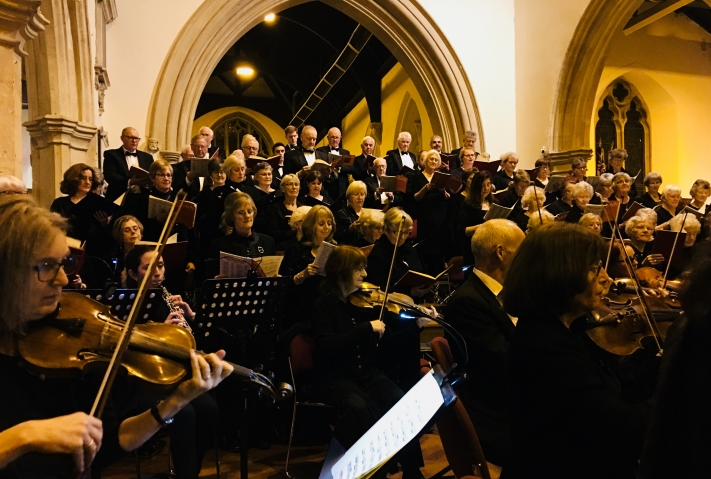Neither Bach's Passions nor Haydn's Creation has ever rivalled The Messiah in popularity. Of all Handel's oratorios, The Messiah gives the most scope for choir rather than soloists, and I think that's a large element of its appeal for musical societies. Eynsham Choral Society is one such, and on this windy Saturday evening in early December, St Leonard's Church (St Leonard is the patron saint of prisoners) was packed out for one of the seven or eight Messiahs being performed this Christmas season in Oxford and nearby.
The Oxford Players under ECS Musical Director Stuart Dunlop got us off to a strong start with the Sinfonia before we heard from tenor Ben Alden, pleasingly forthright with the opening recitative Comfort ye, comfort ye and then his aria Ev'ry Valley. I particularly enjoyed his relatively dramatic approach, justifiable given that the work was not intended by Handel as part of a devotional service but as middle-class entertainment, albeit of the pious variety, and not far removed from the stage of the Italian opera house.
When the choir came in with And the glory of the Lord, the imbalance of male voices (23, only nine of them tenors) to altos and sopranos (58) was immediately apparent. Of course a musical society can only field the singers who come forward to rehearse and perform, and this gender discrepancy is a common phenomenon in amateur choirs. So although the men struggled on occasion to come across loud and clear, the quality of the overall sound I thought very good, with the interplay of part singing between altos and sopranos especially so, notably in the three chorus numbers at the start of Part II: Surely He hath borne our griefs, And with his stripes and All we like sheep. They also came up with a bold volume for the big numbers; the Hallelujah, of course, and also the final Worthy is the Lamb with its extended Amen.
Of the soloists, Ben Alden shone again much later in his Thy rebuke recitative and its associated aria Behold and see, combining movingly with the violins and organ of Gabriele Damiani, playing continuo, as Handel himself used to, in the 36 plus times he conducted and played the Oratorio. The quality of the other soloists I thought a little mixed. Soprano Raphaela Papadakis did well in delivering the sinuous turns of her three quick recitatives commencing with And there were shepherds, but in the important I know my redeemer liveth at the start of Part III, her voice tended to fade away in respect of the notes at the bottom of the range. Alto Tim Morgan's tone was admirably clear, though he lacked a bit of projection in his opening But who may abide and elsewhere, and once or twice stumbled over the libretto, while baritone Timothy Nelson had the fine presence of a Victorian gentleman, but was slightly uncomfortable in following Handel's chromatic wanderings in The people that walked in darkness.
Stuart Dunlop maintained a brisk pace throughout, not allowing the repetitions to lag, and gave both his choir and The Oxford Players clear, sympathetic direction. The latter, joined late on by the required pair of trumpets, were impressive throughout in their sustained concentration; the quality of their playing above average for an amateur band.
The importance of the Choral Society to the village was evident in the interval when the throng raised a fair old hubbub of merry talk and laughter. Together with the friendly welcome at the door from Esme Wyatt and others, this made for a rare evening of music and pre-Christmas cheer.




